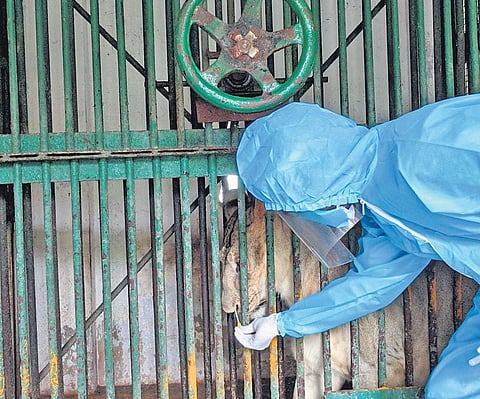

CHENNAI: Well before COVID-19 made its entry into India, the Chennai-based Advanced Institute for Wildlife Conservation (AIWC) proposed to conduct studies on zoonotic transmissions and genome sequencing of emerging strains. The project was in fact approved by the Tamil Nadu State Planning Commission at the end of 2019, but no funds have been released till date.
The World Health Organization (WHO) defines zoonotic diseases as those which are naturally transmitted and shared between other vertebrates and humans. These include a range of bacteria and viruses that cause diseases like rabies, yellow fever, influenza and COVID-19.
Shekhar Kumar Niraj, Special Secretary at the Environment and Forests Department and the man who built AIWC from scratch, told The New Indian Express, "It's very important to study zoonotic diseases to strengthen surveillance for early and effective diagnosis, which helps us in timely containment. In India, the huge human and animal population increases the probability of human-animal contact and spread of zoonoses. Take for instance, the outbreak of COVID-19 among Asiatic lions in Vandalur Zoo. We don't have an explanation as to why a young and healthy lioness Neela died within 24 hours after showing symptoms. More research and genome sequencing of the strain that killed Neela will help us know about the incubation period of the virus in big cats etc."
Niraj was the director of AIWC, a Tamil Nadu government enterprise under the forest department, when the project was proposed under the Planning Commission's Tamil Nadu Innovation Initiative. A sum of Rs 1.5 crore was all that was asked for to begin the research. "The project proposal got a lot of traction and the State Planning Commission approved it, but unfortunately within a couple of months the coronavirus began playing dirty."
The project deals with animal pre-screening for pathogenic diseases, studying zoonoses and reverse zoonoses, developing easy diagnostics for field staff to determine whether an animal is suffering from any disease, besides carrying out genome sequencing. AIWC has advanced facilities like in-house RT-PCR testing and state-of-art molecular microbiology lab, but they are being underutilized due to lack of qualified manpower and leadership.
An official at the Vandalur Zoo told The New Indian Express, "The zoo sent the first set of four swab samples of lions on May 24 and another seven samples on May 29 to the National Institute of High Security Diseases, Bhopal in Madhya Pradesh. However, the results of all samples came only on June 3, the day lioness Neela died. Luckily, we did not carry out a post-mortem, otherwise our veterinarians would have been at risk."
The AIWC, located on Vandalur road, can easily be augmented to carry out COVID-19 tests of animal samples with little support. "These projects must be expedited because today we have very little information on which animal is dying of what disease. Hundreds of elephants are dying in Tamil Nadu, several tiger and leopard deaths are reported in national parks. So far, the Tamil Nadu forest department has not bothered to send even a single swab sample to check for presence of coronavirus in the wild," rued a retired forest official.
A scientific paper titled 'Zoonotic Diseases in India' published in the Indian Journal of Community Medicine in March 2020 says zoonotic diseases have been increasing globally as well as in India. Of 1407 human pathogens, 816 were zoonotic, i.e., capable of being transmitted naturally between animals and humans. These include 538 bacteria and 208 viruses. The study also highlighted that as many as 177 (13%) of the total pathogens were emerging or reemerging, and of these 130 (75%) were classified as zoonoses. "Emerging infections usually prove more threatening because humans have little information about their origin and many of their epidemiological features remain unknown. The economic impact is also not too well delineated. It is likely to be in billions of dollars," the study said.
Many of these pathogens have the potential to travel a long distance and often catch health authorities unprepared. Examples include plague, Nipah virus, Ebola hemorrhagic fever, Zika virus and COVID-19, the study added.